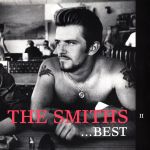Supplemental
Part Eight
Photo of The Smiths by Lisa Haun. Reproduced without permission.
This interview with Morrissey and Marr originally appeared in issue #6 of the magazine/ record Debut.
Far From The Madding Crowd

by Roger Morton
"It is almost impossible to be content. It's absolutely humanly impossible. You spend your entire life with this driving force for contentment, and you never actually arrive. You're putting everything off for a day in your life that never happens. You realise you have spent your whole life waiting for one specific day, and it's very strange, it's like whether you decide to marry or to stay single - no matter which path you take, a certain amount of guilt creeps up on you. You realise that your life is passing, and you think 'what exactly have I done, and have I lived?"
Steven Morrissey
"I think it's sad that teenagers seem to be getting too sophisticated to be teenagers anymore. I think that very soon we're going to reach the age where the very idea of being in a group is uncool. The very idea that someone plays an instrument and tries to say something serious to their contemporaries is very soon going to be deemed uncool. The pop group industry certainly is soon going to be dead."
Johnny Marr
CONTENTMENT is impossible. The pop group is to pass away - Dramatic, panoramic statements fall from the lips of Morrissey and Marr like the petals from a dead bunch of daffodils. Morrissey's sweeping limbs, gestures and pronouncements have brought him a long way from his low-life, low-profile Manchester seclusion. This obstreperous, enigmatic, willfully thoughtful figure is the most obvious current embodiment of the definition of fame as the state of being 'conspicuously miserable'. What, is there no gratification, no affection to be found in the attention of the anonymous public face? Is there no society in notoriety? Having recently set off for a holiday in Italy, and ended up in Morecombe, a bored Morrissey and Johnny Marr returned to London to write and reflect. Now that the Mancunian prophets are amongst the profits, have they learned any new jokes?
Morrissey: "People believe that the minute you get into the Top 20 you couldn't possibly be unhappy. Everything is there - you have it. You go on Top Of The Pops, which is only a few hours out of a week, and it doesn't fulfil you. You're still the same person - it doesn't erase the past decade. The way I've lived is too engrained for me to ever escape. I don't think I'll be dazzled by the lights."
Morrissey seems confident that even under the flattering, fawning studio lights his vision will remain clear. Yet the problems and contradictions of expressing the pain of isolation and loneliness amidst a crowded, giggling commercial world are not easily side-stepped. How to retain the required detachment?
Morrissey: "I was very aware of how things could change, and how easily I could be surrounded by people who wanted to know me. So I made a conscious severe effort to block off all those obvious 'pop' things. The whole idea of being a 'popular figure' - I said no, I don't accept them, they're just synthetic and shallow. For me things haven't changed, I haven't fallen into this wonderful whirlwind of activity where I'm the life and soul of the party. I couldn't do that because I don't have the training. There's a kind of sect of people who surround groups - I could be surrounded by people tonight, but that's not the point. They have to be there for the right reasons."
As the hangers on are left dangling in the lurch, The Smiths continue to put out taut, tender singles - their enthusiasm for the songs preventing the band from storing them for a second LP. Satisfaction refuses to be forged in The Smiths' smithy.
Morrissey: "I'm certainly not satisfied. I don't sit back and say 'phew, now I've done it I'll lie down and watch the cloud formation. Lots of things still anger me. I read the press and it angers me, I feel I've got to be stronger, and go at things harder. There are still things to be done."
Just as the perfumed waters of success have failed to soothe Morrissey's furrowed brow, Johnny Marr seems, with the exception of a slowly creeping 'rock haircut', to be untouched by the shining limosine lure of 'music biz' achievement.
Johnny Marr: "I could quite easily be happy back on the dole writing songs with Morrissey. There are times, and it's getting more and more so as we get bigger, that I really do yearn to be unsuccessful just because things are a lot less complicated when you're unsuccessful. So sometimes I wish I could go back to just rehearsing and playing in Manchester, and sort of having a little cult following. But then I know really that I want to be the biggest superstar in the world. (laughs)."
Johnny Marr in the market-place, at 20 years - young, gushing and single-minded.
Marr: "We have a great affection for putting records out. We have such a yearning for A-sides. We really do see singles as being important."
The other partner in the Morrissey dance of maudlin celebration gives forth a stream of consciousness blur of words attesting to a boundless enthusiasm for the band.
Marr: "I could have no money and I'd still be as happy, or maybe even happier than I am now. I think that we have integrity in that we are still in it for the beauty of our songs, and for the joy of playing. We've never believed in being safe and tidy, and a lot of people are criticising us for that, but I think the new LP is probably going to sound a bit more basic, the production will be a bit more rough. I like the fact that we've got this feeling that we really do want to take risks. Most other groups get to this stage, and they're worried about losing the superficial rewards, like not appearing on Top Of The Pops, and not being able to keep their drug habit going."
Johnny Marr bemoans the inevitable arrival of a bedraggled Smiths backlash now that they're an 'established' group. The guitarist protests that their hearts aren't pinned to the charts even if their singles are.
Marr: "We're still Mike, Johnny, Morrissey and Andy, and we really do feel weird in this environment. Every time we go on Top Of The Pops it is very much like new boys at school. We don't 'hang out in the bar' with other groups. It's not as if, once we had a load to moan about and now we've got successful it's great, we're in the music business - Hi Ian McCullough, Hi Roddy Frame'. It's not like that. We do feel like we're four boys far away from home a lot of the time."
Lost and lonely in the cold, windy city of recognition, hugged and held tight in spurious affection by the cheating arms of fame, Morrissey and Marr are denied the luxury of anonymity.
Morrissey: "I often feel that the popular music scene is made up of lonely people. You look at it and say 'well, they're all there together, they're all famous, and they go out every night, and they hate money because they're sick of looking at it'. And it's not true. The few people I've met are on their own. There's no such thing as comradeship. Audiences think 'oh you've done it now, you're a pop star, you're part of the establishment'. It's like being a member of the House of Lords, that's how it's viewed, but of course it isn't."
So just as the pop charts serve to subtly fascinate and reassure those outside them with the illusion of a 'community', and 'participation', the Morrissey in the music machine can find only false community within. And so the focus of his writing survives.
Morrissey: "The focal point for me, which always bores people, and appears to be total self exhibition, and if you talk about it you must be insane, is loneliness. Because I experienced it for so long, and I realised many other people did also, but it's something that's severely suppressed, certainly within popular music. I do write for people who wouldn't normally go to concerts, watch television, buy records or listen to the radio."
Hip music for the chronically un-hip. Within the pop industry The Smiths find themselves to be queer fish out of water. They will not adapt their sensitive, fey fins to the requirements of a dry business land.
Marr: "I don't want to become an established figure of the music scene. Some days I think 'aah...' I'd hate to be thought of as just another member of some group who're in Smash Hits. I don't want to be thought of as fitting into this great long line of guitarists."
Yet with the latest, 'William, It Was Really Nothing', The Smiths continue to burrow into the soggy flesh of the pop fruit, biting at almost all the features that '80s pop is currently sporting - the synthesisers and computers, the mega-production, the media hype and the contrived, vainglorious image. As fish against the mainstream, why do they choose to swim at all?
Morrissey: "If you're serious about performing you reach a point where you say 'I can't possibly watch anyone doing this anymore. I have to do it for me'. You must make a choice in life, you have to be the sheep of the world, or the shepherd. To me it's like suicide - you reach a point where you can't consider your mother anymore, you can't consider the neighbours - you have to act. It was difficut for me because I was so introspective, and quite clumsy, but you reach a point in life where you can't consider shyness, you've got to walk the plank."
Despite his forthright public image, Morrissey insists on the persistence of his 'shyness'. Marr's insight on the Morrissey enigma sheds a little light on the paradox.
Marr: "He's the most unlikely sort of sex symbol/pop star/personality for a long time. He's gone from being a complete recluse in his bedroom to being a national character. I'm sure he feels good about it, but there are a lot of bad things too. People are looking for this Morrissey parody - I mean he doesn't like to be summed up in two sentences, and a lot of people try that."
Morrissey, the sensitive charmer (to sum him up) admits to being reluctantly affected by criticism.
Morrissey: "You know, it's like we all know it's futile to worry about death, but we let it plague us anyway. (Smiling) I devote a few minutes every day to it."
The worry beads around Morrissey's neck are too heavy to be carried alone.
Morrissey: "I believe that in order to put one's plans into action you really do need some encouragement. Not necessarily to be led all the way to the altar, but in a certain way I'm sure."
Johnny Marr is equally willing to admit to the shared burden of responsibility and guilt for the success of The Smiths.
Marr: "If I hadn't met Morrissey I probably would have spent some time in some kind of institution. No, I probably would still be in Manchester writing tunes for nobody. I could never be in a group where I wasn't a fan of the lead singer, and that never happened until I met Morrissey."
Interdependence is everything in The Smiths. Johnny emphasises the vital role played by Andy Rourke and Mike Joyce - the essential 'human backbeat'. And when Johnny says The Smiths are good, Johnny means hyperbole good.
Marr: "The secret of being a good group is to really believe that you're the best group in the world, the most valid group in the world, and in spite of all our criticisms, I really do believe we're better than everybody else. We're young, I'm only 20, and this sounds very 'cardboard rebel' but I do feel that I still have a very basic hatred for authority.
Being in The Smiths now is basically even more of an ideal state than when we first started, because the three members are me best friends."
And unless Morrissey's flirting with the notion of one day getting involved in film, "isn't it a cliche: the pop star blundering into film," unless the film screens get in the way, the ideal state of The Smiths' art will persist and resist the horrors of rock life, and Morrissey the dancing pessimist will twist and twist. The Smiths: the kind of people who can shake it when they're feeling blue.
Morrissey: "In many respects the future is black... Isn't it curious that all modern things in life aren't terribly attractive. Change is never for the better. In our individual lives we can fall in love and the world can seem quite acceptable, but it's a world within a world, which is how most people live, but in the general scheme of things, the only way is down."
Shake it.
Thanks to Keiko Kondo for donating this item.
Reprinted WITHOUT PERMISSION for non-profit use only.
This interview with Morrissey dates from late-1983 and originally appeared in the fanzine Rorschach Testing. The interviewer/author is unknown.
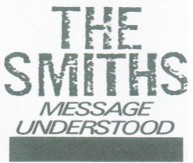
The Smiths...
and the beginning of '83 gave us 'Hand In Glove' and, if for no other reason, we should be damn grateful and say 'thank you to the beginning of '83'. Go on, say it... "Thank you beginning of '83". Unless you're initimately connected with an up and coming band it'll be the first public offering that grabs or misses the nation's ears.
'Hand In Glove' came from absolutely nowhere. On vinyl, literally from nowhere in fact, 'cos it fades in, warms and fades out.
"Who the hell are they?"
Sessions for both Peel and Jensen have since run amok and November '83 sees the birth of more Smiths offspring.
"The Smiths - are pleased to announce the safe arrival of 'This Charming Man' on October 28, 1983 who weighed in at both 7" and 12". Special thanks to all the maternity staff at Rough Trade."
... are precious.
Morrissey has declined for the moment to participate in the scramble upstairs to get the gig prospects into shape and instead is deliberating the Smiths' deal with Rough Trade.
"We're signed for five albums with options which means if we record one album and everyone hates the situation, we can say goodbye. I can't see the day coming because we have so much faith in Rough Trade and vice versa, having supplied them with their biggest hit single to date."
Having been approached initially by Factory (their hometown label) he's quick to explain reasons for not pursuing it.
"At the time, to many people, it seemed quite shallow but I think it's proved to be of considerable strength to us. Initially we felt if we went with an accepted Manchester path we would simply be filed along with them... simply overshadowed by the record company, just another Factory group. I think from Manchester, it was time for a new voice, new angle and attitude, therefore it was important to us to so something off the track."
RT: 'Hand In Glove' has a very live feel to it.
"A very emotive and edgy feel which was exactly what we wanted to do. So many recent songs have had a very non-human feeling. When you hear 'Hand In Glove' you feel these people have to play this song and he has to sing those words, very human. It's somewhat of a cornerstone - a very important record."
RT: Titles like 'Handsome Devil' and 'This Charming Man'... is there a slight arrogance?
"I think so yes, a particular underhand arrogance. It sounds po-faced and big-headed because 'Charming Man' and 'Handsome Devil' are certain terms which are, for some obscure reason, not used that often, certain emotions that cannot come to the fore and by shoving them to the fore it's some kind of frontery to people and the fact they accept it as they do is completely pleasurable. I think there's a voice that hasn't been heard in popular music that needs to be heard and... er ... it's mine (laughs)."
RT: Are the Smiths then, going to rule the world?
"Well, I think it's entirely possible, I really do believe it's possible. I look ahead and see everything just flat out waiting to be grasped. It seems quite easy to me."
RT: What would be your first thoughts if The Smiths were No. 1 next week? (numero 32 as we chat), 'about bloody time!'
"Yeah, 'why has it taken so long?' It sounds self-flagellating but that's the attitude. Examine the records that are above us this week and you draw back in horror. I can't see any reason why we do not deserve to be there... not one solitary reason. So many people seem content with the monotonous faces that dominate the entire spectrum of popular music. They're content with Billy Joel. Nobody questions Billy Joel. (Who wants to interview Billy Joel anyway? Ed, oh I see... not that sort of question.) Nobody quizzes people like Iron Maiden. When groups come along that possess a certain amount of brain, people do probe and say 'why this and why that'?
RT: Do you think there's a problem of people shunning away from lyrics of a slightly deeper nature?
"Yeah, they're so used to this structured language, a kind of frozen dictionary, certain terms you can use and when you take a different one it spoils things. We don't follow any particular rule though.
RT: You've done a lot of sessions.
"Mmmm, we've done four."
RT: It seems to be dripping out of your ears. Is it that easy?
"It is... intolerably easy. It's virtually irksome."
We have before us a man not short on profundity and confidence. A question on that morning's breakfast could well have read like Oscar Wilde, had it arisen.
RT: Does it worry you that it's that easy?
"It worries me now because all the sessions have had an incredible amount of airplay. We're slightly overexposed and people are so familiar with what we do. It means that by the time these songs come out on vinyl people might be slightly tired of them. So from that angle, I worry slightly - though it's a pleasurable dilemma."
RT: An album in the making?
"It's finished and should be out January 2. We've written so much material we're just eager to produce as much vinyl as possible."
RT: Where do your lyrical ideas and inspiration come from? You read a lot, don't you?
"Yeah, too much, I've read too much, I know too much (sniggers). No! I don't mean that. Yeah, it's all entirely personal. The way I've lived... I think so many of the most prolific writers take from their own experiences and the writers who don't amount to anything are the ones who go along with the stream of predictability. I had quite an unusual existence for a very long time, of complete isolation, and it was a period of self-development for me when I wrote an enormous amount and felt I had to do something like this. That's entirely where I get every slice of inspiration from."
RT: So it all reverts back to something that's happened?
"Or not happened... I think some of the most profound things that are ever said are using very fundamental English language. People who write all this surreal rambling nonsense that couldn't mean anything to anybody, or you need streams of literature to understand what that person is singing - that has got no value at the end of the day. Lyrically I can not even possibly be misunderstood. Everything has to be basic."
Quite an ironical statement considering the much-flaunted Sun's piece on 'Handsome Devil'. Another in their endless pursuit to put healthy and moralistic journalism back twenty years. I go for it.
RT: Ambiguity does pop up occasionally in your songs.
"It does, but it's a different kind of ambiguity. I think everything is there to be understood. Sensible people will gauge the correct meaning behind it. That little spot of monotony was a very deliberate move on a particular journalist's part - whom I know - who really wanted to create a kind of arched attitude against the group. So I think the whole Sun piece was deliberately misleading."
With the frightening amount of bands that are all fighting for air in places like Liverpool, Glasgow and Manchester and the music press' love of periodically homing in on bristling cities, Morrissey feels that Manchester is a bit special.
"There is a particular mystique about it. I think it's been there for quite a long time. It's difficult living there. You don't see it the same way London journalists who have a very detached view - to them it seems a very quirky place spurting out these geniuses occasionally. It's been an inspiration in the fact that it's always been an intensively depressing place to live. But even from depression in that respect, you can gain some positiveness... (he's momentarily diverted) What is that music? (from hall above) Oh! It's the soundcheck (laughs). I don't recognise the group I've been with for 10 months. It sounded like The Jam... don't put this in print..."
Returning to former times I stabbed at the possibility of a wasted childhood. Did he in fact spend it with his parents.
"Yes I did, though I often felt that I'd be orphaned. I had a completely depressing adolescence so I think that kind of spurs you on with some determination and ambition to do something because you actually realize you're living a pointless life. You have to grasp something quickly which is, I suppose, what I'm doing now."
RT: What were you doing before?
"I did have bouts of journalism and write for various magazines under pseudonyms. I wasn't entirely handicapped, or sit in a box for years. I look back on those years and really can't remember that much. I spent a lot of time in America and that had some degree of influence on me because most of what I saw was entirely relevant and I could see there was great worth in this country where popular music was concerned. It really does seem to have a grip on the entire world and that's why I think it's important to be involved and the main reason why I'm here.
RT: Is your past a reason for being, in particular, a Smith or could it have been another band? Are these three people that special?
"I really can't imagine anything beyond this. Every aspect of this group strikes as personalized perfection. I can't see any reason for moving on. Everything at the moment looks mysteriously good."
RT: Too good? You sound a bit dubious.
"Well, I don't have that much faith in human nature."
RT: Your music tastes have been well harped on. Has there been an over-emphasis of a 60's love?
"I think so, I wouldn't like to be penned as a nostalgia freak. I'm not old enough to actually remember too clearly. The first record I bought was Marianne Faithful's 'Come Stay With Me', and people like Sandie Shaw who simply dominate my entire life."
Hey! You at the back... Bloggs minor, stop laughing boy. The man's serious.
Morrissey has just spilled forth this revelation in a manner akin to describing utopia. Regarding one of the 60's, er, lesser writers he is deadly serious.
"I find almost everything she did to be completely perfect."
For a man whose lyrics can, at times, beautifully enhance a song I find the connection bewildering.
RT: What exactly do you get from Sandie?
"Well, from Sandie..."
RT: Have you ever met the lady?
"The delight of recent months has been meeting her and becoming quite friendly with her. It's been really (a light-hearted swoon follows) too much for me, for the old heart. Sandie is, as we speak, recording a Smiths song which to me is the absolute height of achievement - nothing else need be done. It's a song called 'I Don't Owe You Anything' so we're completely pleased about that. It's an enormous pleasure."
On the Sixties again.
"It just happens that most of the records I couldn't possibly live without come from the 1960's but, obviously, so much of the music was horrendous."
RT: There's a bit of a crooner in you (a comparison to Billy Mackenzie's style is noted).
"Yeah, I do quite like 'crooners'. I'm quite fond of Johnny Ray, Frank Sinatra, people like that... Denis Lotus, who nobody remembers, nobody's even heard of him. Yes, it does appeal to me in one way. Interesting thing about Billy Mackenzie, he actually sent me a tape of his new recordings the other day. Apparantly he's very fond of us."
RT: Does the Irish ancestry make for a religious Morrissey?
"No, I'm self religious but not in the traditional overfed sense. I was raised in a severely Catholic atmosphere and that really turned me against religion. All the prophecies of doom, 'you must brush your teeth or you'll rot in hell and if you don't get out of bed now it's a mortal sin and you will die!' I often find that Catholics are not very Christian. It's this basic fear 'Do as I say or I'll chop your hands off for your own good!' "
RT: You lucky devil!
"Yeah, it's a very weird way of thinking. Most of it's built on sand. I really only believe in things that I can see and touch. I can't see any reason to believe in anything else."
RT: Gigging is an obvious joy.
"Immensely. We've been doing gigs persistently since early May. In London especially, we're slightly overexposed I feel. There are certain things, like today (the organization behind the gig has been a bit untogether) which is just an entire nightmare when you arrive and people are in a complete coma. They don't realize what they're doing. It makes you very angry. Generally though we revel in performances. For the last 12 we've sold out everywhere. We've broken house records over groups who are actually in lofty positions in the charts. It makes you feel everything is working and you are powerful and people are listening."
The catalytic days of 76/77 move further away and there's a growing wealth of bright young ones to whom that era is a big zero in the inspiration stakes. Morrissey mulls...
"I think we are one of the first groups to come along that are completely detached from that period and have no links whatsoever. To me personally it means absolutely nothing. I think the entire music press and so many groups have been afraid to unleash themselves from that period and are afraid to stop talking about it. It seems like in every interview (oh hell! I think this means me) there has to be a question about the Sex Pistols and the whole punk thing. I was on the radio being interviewed by David Jensen and one of the first questions was about punk... I deflated immediately. It's got no relevance to what we do."
RT: Well are you, as a person, in spite of or because of the world circa '83?
"Both really. Everything that happens this year affects me a great deal and there are many issues I feel very angry about. In popular music I think a strong voice is needed and... perhaps it's just blind faith but I really believe we have great value in many many ways. In spite of but also because of anger that this business is controlled by the most monotonous individuals imaginable. There are, also, so many political issues that affect me and I feel that if we can do something... for instance the Electric Ballroom gig [December 19, 1983] in a few weeks for CND is a complete pleasure to me."
Morrissey, like many a rightminded young person, has his political views that could possibly see the light of day in future times by, as he grinningly puts it, "slipping into politics somewhere through the back door perhaps."
RT: Bringing '83 to a close, what does '84 hold on an Orwellian plain?
"Well, I think old George (he smiles) has been slightly overheated. Things haven't changed that much. There's no reason why we can't look forward to 1984 with absolute optimism and determination."
RT: His thoughts on Christmas?
"I think it's the time of excessive violence towards all men" (he breaks out in a broad and lasting grin).
Who'd be a turkey at Christmas?
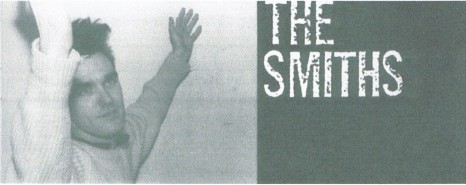
Reprinted WITHOUT PERMISSION for non-profit use only.
SEE ALSO: Message Understood photos
Danny Kelly reviews the CD re-release of four Smiths singles and the American compilation 'Louder Than Bombs'. Less a review, more a critique of record company ethics. Originally appeared in the December 10, 1988 issue of New Musical Express.
PAINT A VULGAR PICTURE

Danny Kelly rattles and hums over the latest Smiths re-issues
"PASS ME my trusty old soapbox! The music on this latest batch of Smiths 'product' (doesn't that hideous - though utterly appropriate - word just drive a stake into your heart?) is mostly so familiar that I feel no qualm whatsoever in an unashamed rant...
Back in the dawn of time, y'see, when Rough Trade first emerged, there was some controversy about the label's name, it being the slang term for those pathetic male wretches who survive around London's railway termini by selling their soft-skinned arses to the highest bidder.
The 1988-style Rough Trade (and its 1989 model too, I'll wager) have bettered themselves, risen, ahem, above their station; now the ass they flog is not their own, but that of The Smiths. And it makes me, the very Smiths completist/fanatic/bore at whom this stuff is aimed, bloody nauseous.
Of the four EPs, two - The 'Heaven Knows I'm Miserable Now'/'Suffer Little Children'/'Girl Afraid' and 'The Boy With The Thorn In His Side'/'Rubber Ring'/'Asleep' sets - are identical, in both content and artwork, to their original British 12" issues; the other two are, to the Smiths collector at least, more tempting...
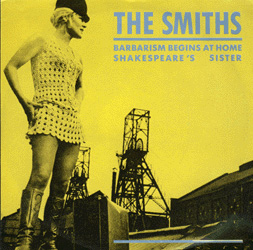
'Barbarism Begins At Home' was never a single in this country, and now appears clad in the infamous picture of Viv 'Spend Spend Spend' Nicholson modelling a ridiculously mini skirt beneath the looming shadow of a pithead winch. The tried and trusted versions of 'Shakespeare's Sister' and 'Stretch Out And Wait' complete the package.
'The Headmaster Ritual' similarly, was only a single in Holland. There it had a beautiful sleeve (a small boy in a cowboy suit lost in the rapture of play) and four live tracks to support it. Now it has a different cover (Ms Nicholson again!) and one less of those b-sides. The catch here is that all the live stuff (including 'Stretch Out And Wait'!) has turned up in this country on the flip of the 'That Joke Isn't Funny Anymore' 12".
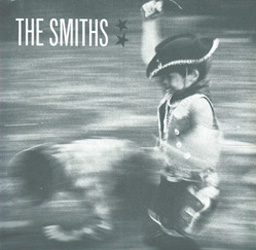
Which brings us to 'Louder Than Bombs', about which there are two things that need immediate expression; one, it is a pretty brilliant compilation of The Smiths work up to and including 'Shoplifters', and two, it is an indictment of the record company's attitide toward the public...
Twenty-four tracks long, it was originally compiled as a beautifully packaged double album to introduce our American allies to the wonderments of Hale's heartiest. At roughly the same time we, the UK mug punters, were asked to cough up for the infinitely inferior 'The World Won't Listen', little suspecting that within 18 months it would be rendered meaningless by the widespread availability of 'Louder...'
'Meaningless'? No less than twelve of the 'World...' tracks (including, naturally, 'Stretch Out And Wait'!) are duplicated on 'Louder...', but the latter is also blessed with such treasures as 'William, It Was Really Nothing', 'Heaven Knows I'm Miserable Now', 'Hand In Glove' and, the list goes on. In any other industry, purchasers of 'The World Won't Listen' would be entitled to a full refund!
A final thought: to what extent are Mssrs Morrissey and Marr - who stand, presumably, to cop a not-so-pretty penny - willing participants in all this nonsense? I honestly think we should be told. (The Music - 10, The Packaging - 8, The Ethics - can a number stink?)
Reprinted WITHOUT PERMISSION for non-profit use only. Illustration by Boone. Reproduced without permission.
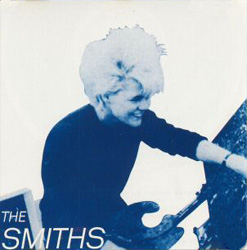
Note: The CD single 'The Headmaster Ritual' was quickly withdrawn after Viv Nicholson, a Jehovah's Witness, objected to the expression 'spineless bastards' in the lyrics. The CD is now a much sought-after piece of Smiths memorabilia.
See the original review here
Ian Cranna and Peter Kane review The Smiths compilations 'Best...1' & 'Best...2' in Q magazine.
"OK, so Warners didn't buy the Smiths catalogue to sit on it, but it's difficult to see the point of another Smiths compilation. It doesn't collect the singles or B-sides. It doesn't offer any rarities, alternate versions or indeed anything previously unavailable, unless you count a first British CD release for This Charming Man. The record company - clearly with an eye to future volumes - claim it's about songs not hits, but quite why Half A Person or Some Girls Are Bigger Than Others merit places to the exclusion of, say, Shakespere's Sister or Big Mouth Strikes Again is far from clear. It's not as if there wasn't room - at barely 45 minutes, this hardly ranks as outstanding value, either. And why the rush release? Surely not to steal a short clap of thunder from Morrissey's Your Arsenal? Still, here it is anyway - 14 generally fine tracks drawn from all the albums, mostly singles, but serving no evident purpose save making money, with music and fans as secondary considerations." **
September 1992
"Accurate statistics may not be available but it's safe to assume that several buckets' worth of tears would have been shed when Johnny Marr announced his departure from The Smiths in September 1987. Whether some tormented souls never quite recovered from this traumatic event, so necessitating the need to purchase afresh both the This Charming Man single and the recently released first volume in such worrying numbers, or whether there's a whole new bedroom-bound generation out there isn't entirely clear. But logic barely comes into it. This is a band that in the popular imagination resolutely refuses to die, which must be all the more galling for its lead characters whose subsequent individual endeavours have so far failed to tickle the collective fancy on quite the same scale.
Whatever the ethics of re-packaging the so recent past in such an unsympathetic manner, the demand quite clearly exists and many of the songs, of course, still resonate with a melancholic extravagance, thanks to Morrissey's patent delight in the English language that can range from the vernacular to the plain foppish in a single breath. In these hands, the feelings of alienation, the desperate craving to be loved and the obsession with one's own mortality take on their own allure.
Never has such self-inflicted misery sounded so glamourous or so amusing an option in popular song. Even on this motley collection of hit singles, favoured album tracks and B-side obscurities like Girl Afraid and the tepid Oscillate Wildly, the results are never less than entertaining, even when tangling head-on with emotional and physical abuse on The Headmaster Ritual or Reel Around The Fountain's dark sexual secrets.
On paper, the partnership between the isolated, perpetually adolescent Morrissey and his younger, more buoyant and worldly musical partner, Marr, shouldn't have got off the drawing board, but the contrast proved both the spur and the necessary balance to their success. It's still a surprise to be reminded how easy they made it seem with spare, almost understated arrangements to complement those fey, fluttering vocals. It's only on later tracks like the high parody of There Is A Light That Never Goes Out and the knowing but still majestic sweep of Last Night I Dreamt That Somebody Loved Me that an obvious disssatisfaction with the limitation's of the band's jangly guitar structure resulted in a denser production, so signalling their inevitable demise.
You could probably make out a damining case against The Smiths for being almost single-handedly responsible for the present flaccid state in British rock, for having spawned a host of grim-lipped imitators without the tunes, the ambiguous gender hopping, or gift for self-mockery. Better, surely, to regard them, along with Madness and Pet Shop Boys, as final torch bearers for English pop in the '80s, more fully in tune with the hopes and fears of a pop generation than anyone until Nirvana." ****
December 1992
Reprinted WITHOUT PERMISSION for non-profit use only.
See the original review hereThis review of 'Best...1' appeared in Select magazine.
"There's no way you could be disappointed by this compilation. Whether you loved or hated The Smiths, 'Best..1' will rejuvenate your prejudices. The selection of tracks, though seemingly completely arbitrary, is more or less spot-on. But then it's hard to go wrong with a collection like this one.
The Smiths have always worked best on compilations because their own powers of selection were never quite up to scratch. You got the feeling they'd release practically anything once it had been recorded, so every demo tape and half-baked idea eventually ended up on vinyl. Compilations, therefore, are more important to The Smiths than perhaps any other band of recent memory.
But even so, it seems more than a little calculated for WEA to use the astonishing loyalty of Smiths fans to shift a few units. At least 12 of the 14 songs here are undeniable classics, but if there were some plan behind the thing other than to make a killing, we'd all feel happier about it.
Still, the album does well in soothing away the aches and pains of such a dilemma. Halfway through it and you're thinking of nothing except what a wonderful time you're having. 'This Charming Man' opens business, followed closely by 'William, It Was Really Nothing' and 'What Difference Does It Make' in an appropriate sort of way, living here and in our collective memory as the first traces of Smithery.
Then, with no warning, we're thrown forward to the 'Strangeways, Here We Come' LP with 'Stop Me If You've Heard This One Before' and the pleasingly slight 'Girlfriend In A Coma'. There's no rhyme or reason to this fast-forward through time, but with songs of this quality, at least the effect isn't jarring. The Smiths were consistent; they never went through any equivalent of a blues period, so their compilers can draw a straight line through their career without much of a problem.
This is both good and bad. True, if you were to make a C90 for an uninitiated friend, then the songs here would do nicely ('How Soon Is Now', 'Half A Person' and 'Please, Please, Please Let Me Get What I Want' are dead certs to lull the unsuspecting into Morrissey's Disneyland of Woe), but without a theme to the album, the question remains: where is all this going to end? Is every Smiths song ever recorded destined to be re-released in some spurious format? And will Smiths fans continue to buy them simply to have another doomed '50s figure - one plucked seemingly randomly by WEA - to spice up their collection of record covers?
If you spent the '80s in a hole, then 'Best... 1' will serve well to introduce you to the most original and consistently fascinating band of that decade. But those of you who haven't hidden yourselves away will no doubt already have 'The World Won't Listen', 'Louder Than Bombs' or, indeed, the entire Smiths back-catalogue. It is to this latter group that the final sentence of this review is dedicated.
You don't need this album. Don't buy it. Five boxes for content. None for cheek."
Graham Lineham
Reprinted WITHOUT PERMISSION for non-profit use only.
To read a review of the 1995 'Singles' compilation, click here
This curious item detailing rumours of a Smiths reunion and tour originally appeared in the September 16, 1989 issue of New Musical Express.
Smiths to reform?
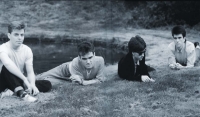
Persistent rumours that The Smiths will re-form gained weight this week with reports from Europe that the band are to tour there in the New Year.
One French promoter who had been booking dates for a solo tour by Morrissey in the autumn has been told to scrap the plans because The Smiths will travel there in early 1990.
Two independent sources contacted NME this week to confirm the rumours, but there's been no official announcements of a reunion by the band, who split up two years ago after more than a dozen hits.
And if The Smiths do play Europe, will they play dates in the UK?
A spokesman at Bandstand, who were brought in to promote Morrissey's Wolverhampton show last December, told NME: "There were stories that Morrissey was going to play Europe, but not the UK. I haven't heard anything about The Smiths touring, that's an interesting one.
"But there's been so much confusion in the past, following their break-up that it's hard to tell who actually represents them."
Certainly, it would make commercial sense for The Smiths to get back together and the latest stories coming out of Manchester say that Morrissey and Marr are back on speaking terms.
On top of the Smiths stories, however, comes another tale that Morrissey will end his stint as a solo artist by headlining a Christmas show at Manchester's GMEX.
Reprinted WITHOUT PERMISSION for non-profit use only. Photo by Kevin Cummins. Reproduced without permission.
Note: Morrissey never played any Christmas show at Manchester's GMEX.
This rumour of a reunion probably stemmed from the fact that Morrissey had recently been in the studio with Andy Rourke, Mike Joyce and Craig Gannon recording 'The Last Of The Famous International Playboys' and 'Interesting Drug' singles. (Morrissey and Rourke even co-wrote a couple of songs together, 'Get Off The Stage' and 'Girl Least Likely To', which appeared as B-sides on the 1990 singles 'November Spawned A Monster' and 'Piccadilly Palare'.) But whether Morrissey ever actually planned to appear on stage with Rourke, Joyce and Gannon for a European tour is anyone's guess.
See the original item here

